A Detailed Analysis of Contemporary Issues in IT: Social Equity Focus
VerifiedAdded on 2023/06/03
|7
|1547
|469
Essay
AI Summary
This essay explores the contemporary issues surrounding social equity in information technology, focusing on how access to and use of the internet impacts various aspects of life such as education, healthcare, and social interactions. It highlights the disparities in internet access and the resulting social inequalities, particularly the gap between the rich and poor. The essay also addresses the potential risks associated with unrestricted internet use, including social isolation and exposure to misinformation. It emphasizes the importance of government and community initiatives to promote equitable internet access and responsible usage, ultimately aiming to reduce social issues and foster a more inclusive digital society. The work references several studies and articles to support its claims, arguing that addressing social equity in IT is crucial for the development of a knowledgeable and connected society.
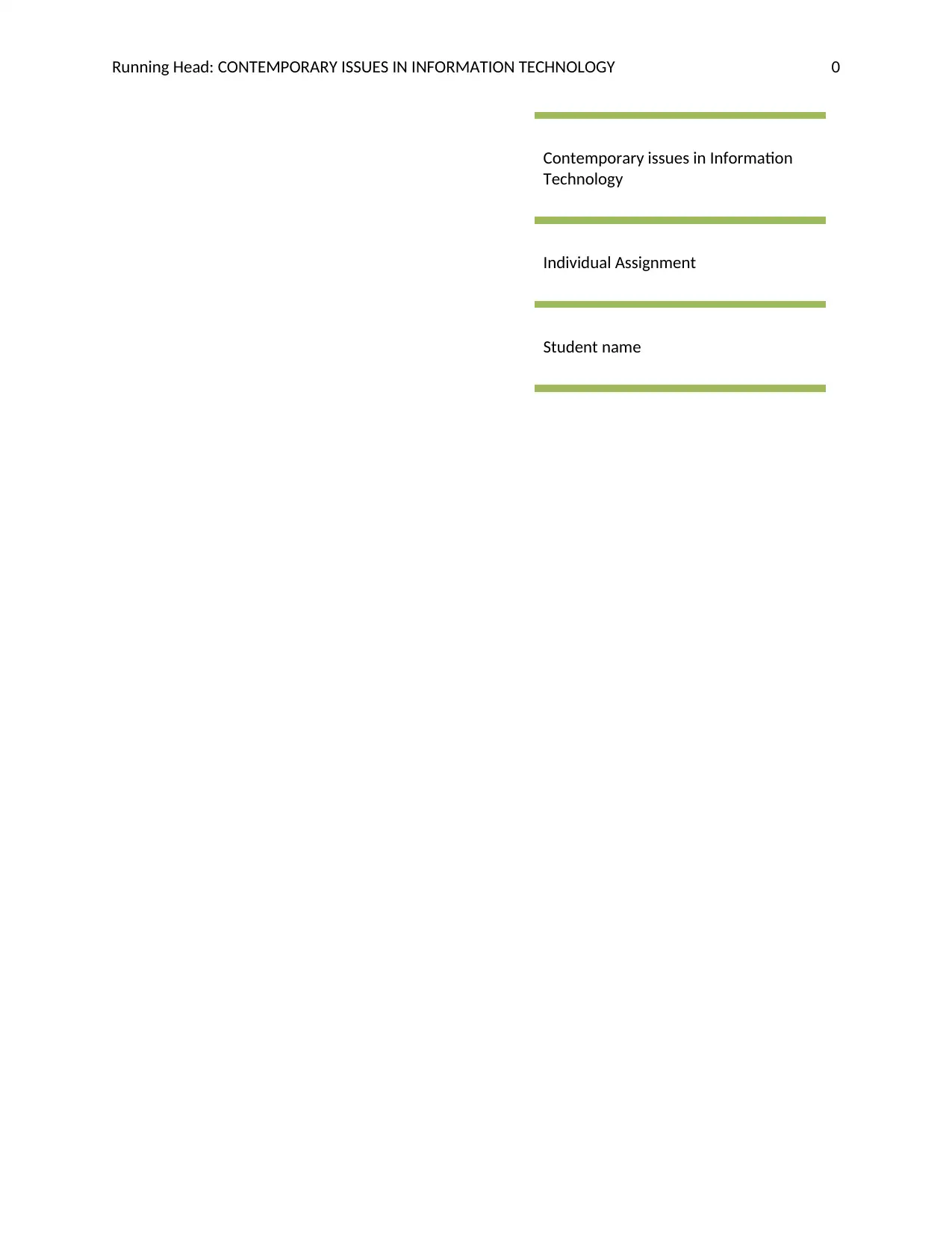
Running Head: CONTEMPORARY ISSUES IN INFORMATION TECHNOLOGY 0
Contemporary issues in Information
Technology
Individual Assignment
Student name
Contemporary issues in Information
Technology
Individual Assignment
Student name
Paraphrase This Document
Need a fresh take? Get an instant paraphrase of this document with our AI Paraphraser
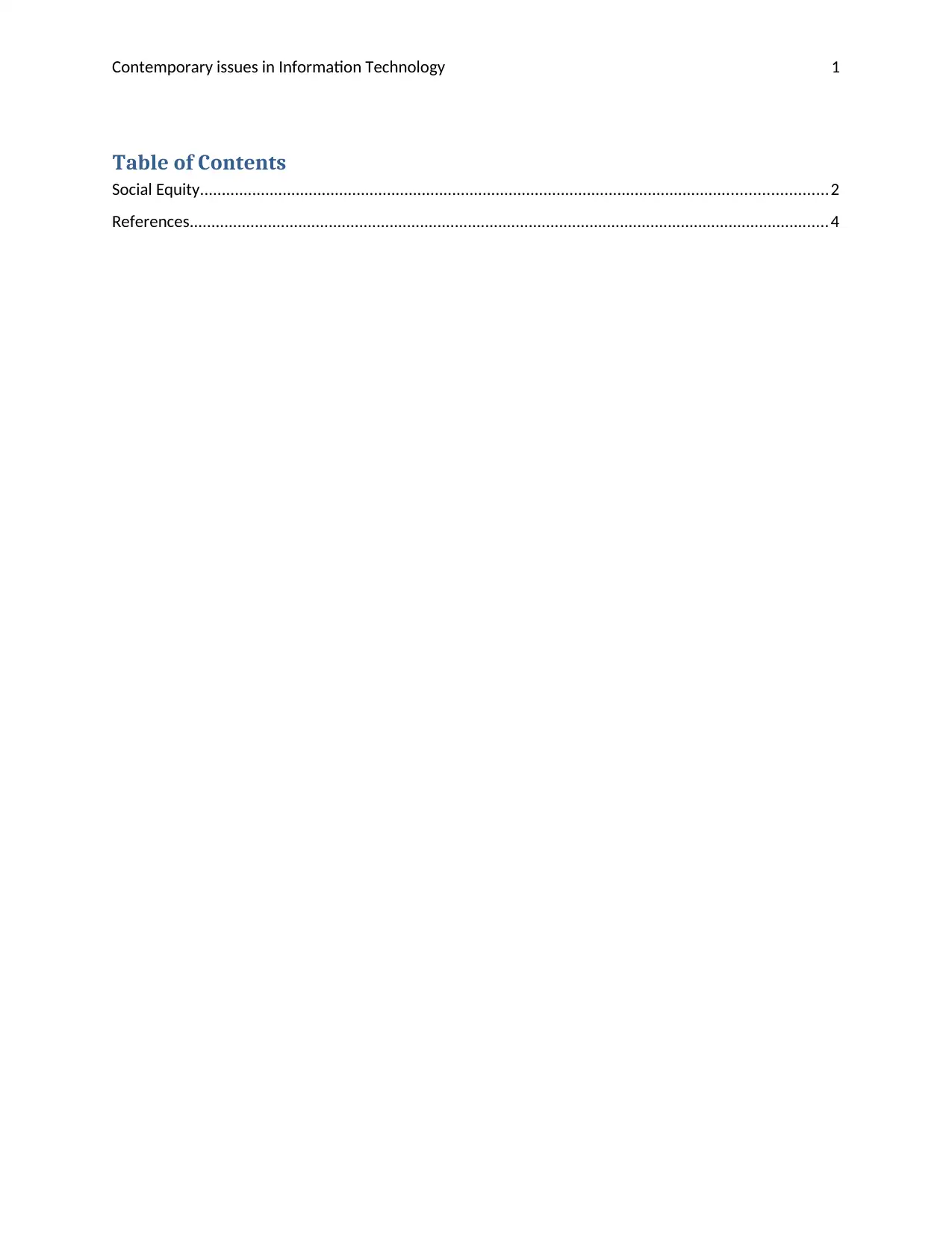
Contemporary issues in Information Technology 1
Table of Contents
Social Equity................................................................................................................................................2
References...................................................................................................................................................4
Table of Contents
Social Equity................................................................................................................................................2
References...................................................................................................................................................4
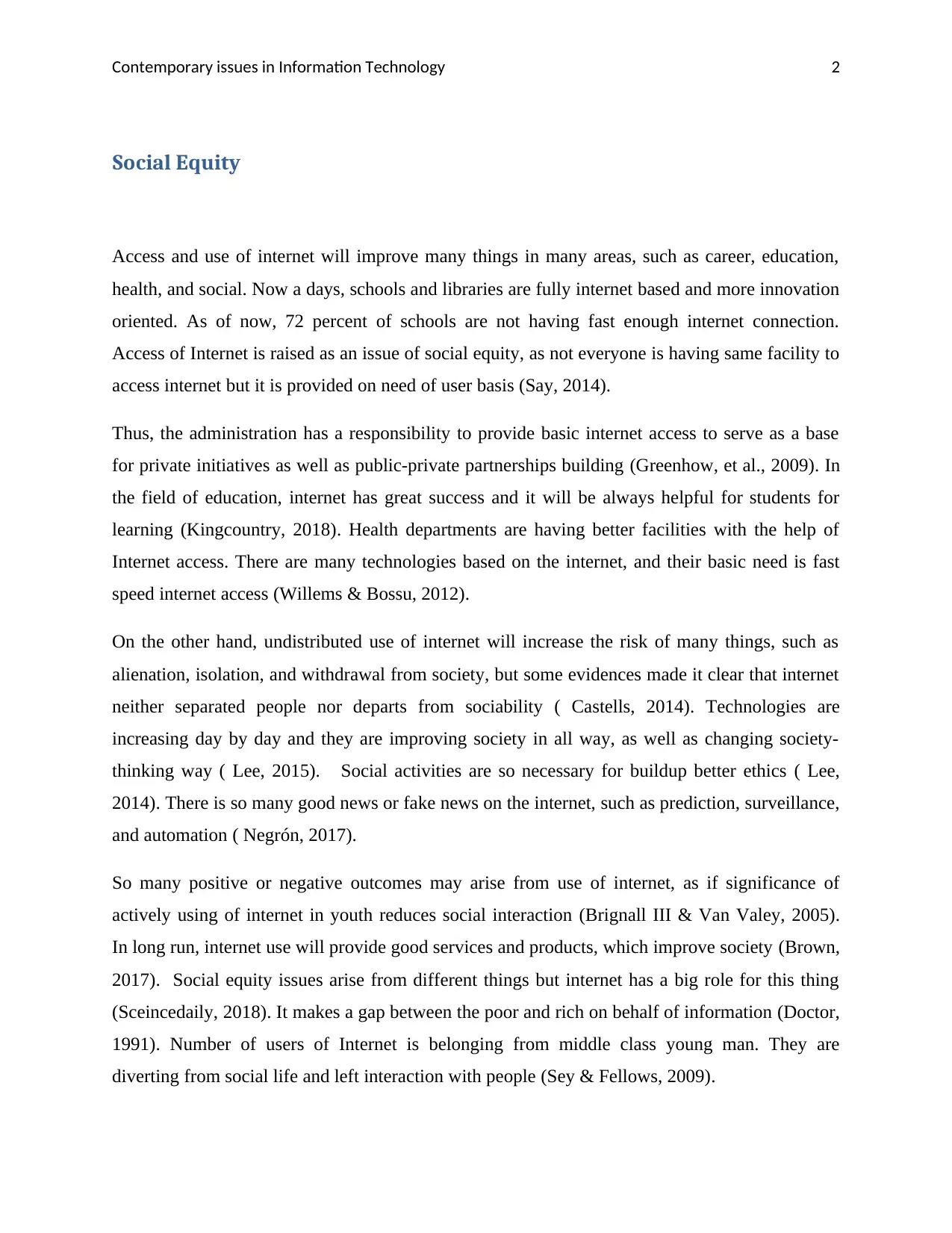
Contemporary issues in Information Technology 2
Social Equity
Access and use of internet will improve many things in many areas, such as career, education,
health, and social. Now a days, schools and libraries are fully internet based and more innovation
oriented. As of now, 72 percent of schools are not having fast enough internet connection.
Access of Internet is raised as an issue of social equity, as not everyone is having same facility to
access internet but it is provided on need of user basis (Say, 2014).
Thus, the administration has a responsibility to provide basic internet access to serve as a base
for private initiatives as well as public-private partnerships building (Greenhow, et al., 2009). In
the field of education, internet has great success and it will be always helpful for students for
learning (Kingcountry, 2018). Health departments are having better facilities with the help of
Internet access. There are many technologies based on the internet, and their basic need is fast
speed internet access (Willems & Bossu, 2012).
On the other hand, undistributed use of internet will increase the risk of many things, such as
alienation, isolation, and withdrawal from society, but some evidences made it clear that internet
neither separated people nor departs from sociability ( Castells, 2014). Technologies are
increasing day by day and they are improving society in all way, as well as changing society-
thinking way ( Lee, 2015). Social activities are so necessary for buildup better ethics ( Lee,
2014). There is so many good news or fake news on the internet, such as prediction, surveillance,
and automation ( Negrón, 2017).
So many positive or negative outcomes may arise from use of internet, as if significance of
actively using of internet in youth reduces social interaction (Brignall III & Van Valey, 2005).
In long run, internet use will provide good services and products, which improve society (Brown,
2017). Social equity issues arise from different things but internet has a big role for this thing
(Sceincedaily, 2018). It makes a gap between the poor and rich on behalf of information (Doctor,
1991). Number of users of Internet is belonging from middle class young man. They are
diverting from social life and left interaction with people (Sey & Fellows, 2009).
Social Equity
Access and use of internet will improve many things in many areas, such as career, education,
health, and social. Now a days, schools and libraries are fully internet based and more innovation
oriented. As of now, 72 percent of schools are not having fast enough internet connection.
Access of Internet is raised as an issue of social equity, as not everyone is having same facility to
access internet but it is provided on need of user basis (Say, 2014).
Thus, the administration has a responsibility to provide basic internet access to serve as a base
for private initiatives as well as public-private partnerships building (Greenhow, et al., 2009). In
the field of education, internet has great success and it will be always helpful for students for
learning (Kingcountry, 2018). Health departments are having better facilities with the help of
Internet access. There are many technologies based on the internet, and their basic need is fast
speed internet access (Willems & Bossu, 2012).
On the other hand, undistributed use of internet will increase the risk of many things, such as
alienation, isolation, and withdrawal from society, but some evidences made it clear that internet
neither separated people nor departs from sociability ( Castells, 2014). Technologies are
increasing day by day and they are improving society in all way, as well as changing society-
thinking way ( Lee, 2015). Social activities are so necessary for buildup better ethics ( Lee,
2014). There is so many good news or fake news on the internet, such as prediction, surveillance,
and automation ( Negrón, 2017).
So many positive or negative outcomes may arise from use of internet, as if significance of
actively using of internet in youth reduces social interaction (Brignall III & Van Valey, 2005).
In long run, internet use will provide good services and products, which improve society (Brown,
2017). Social equity issues arise from different things but internet has a big role for this thing
(Sceincedaily, 2018). It makes a gap between the poor and rich on behalf of information (Doctor,
1991). Number of users of Internet is belonging from middle class young man. They are
diverting from social life and left interaction with people (Sey & Fellows, 2009).
⊘ This is a preview!⊘
Do you want full access?
Subscribe today to unlock all pages.

Trusted by 1+ million students worldwide
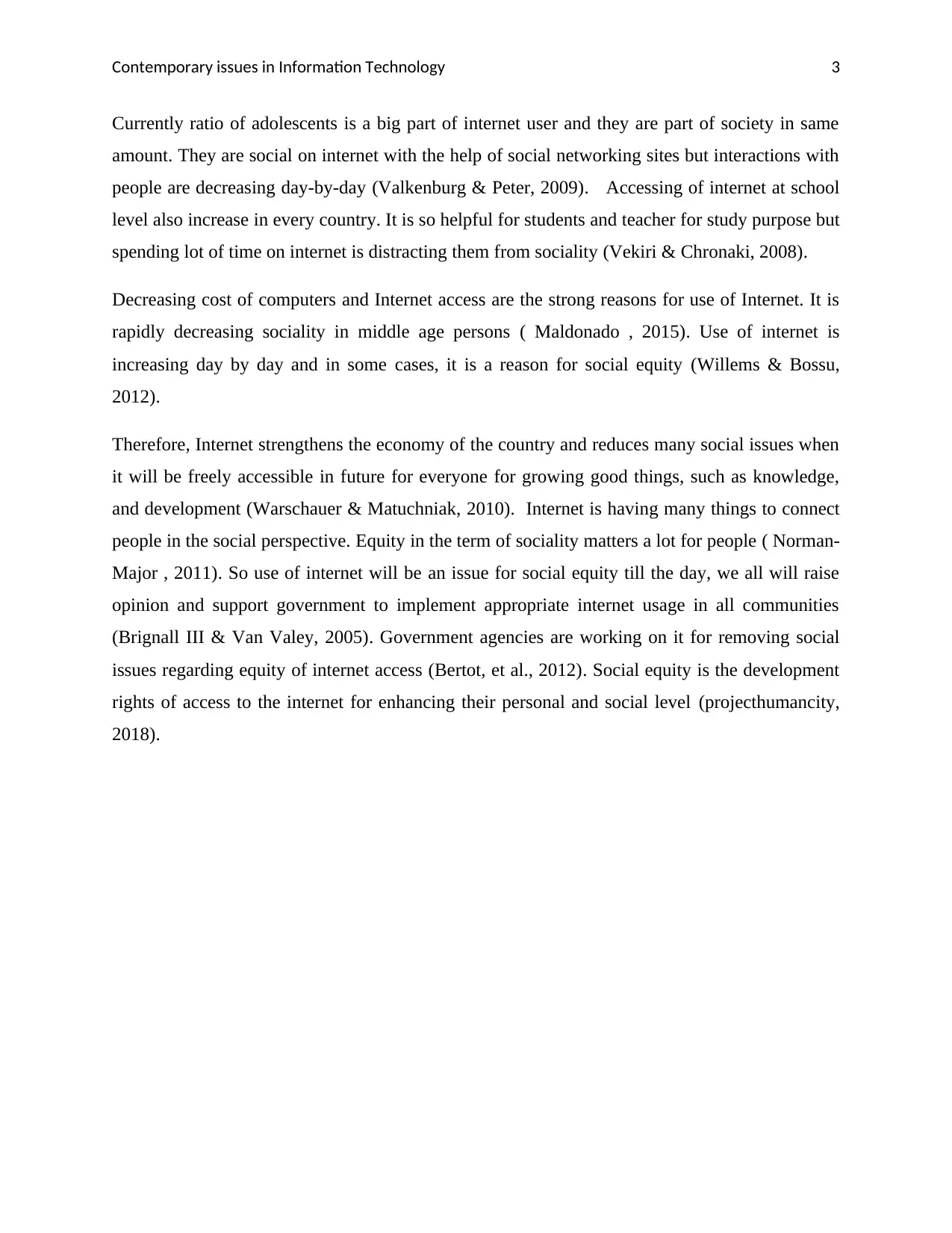
Contemporary issues in Information Technology 3
Currently ratio of adolescents is a big part of internet user and they are part of society in same
amount. They are social on internet with the help of social networking sites but interactions with
people are decreasing day-by-day (Valkenburg & Peter, 2009). Accessing of internet at school
level also increase in every country. It is so helpful for students and teacher for study purpose but
spending lot of time on internet is distracting them from sociality (Vekiri & Chronaki, 2008).
Decreasing cost of computers and Internet access are the strong reasons for use of Internet. It is
rapidly decreasing sociality in middle age persons ( Maldonado , 2015). Use of internet is
increasing day by day and in some cases, it is a reason for social equity (Willems & Bossu,
2012).
Therefore, Internet strengthens the economy of the country and reduces many social issues when
it will be freely accessible in future for everyone for growing good things, such as knowledge,
and development (Warschauer & Matuchniak, 2010). Internet is having many things to connect
people in the social perspective. Equity in the term of sociality matters a lot for people ( Norman-
Major , 2011). So use of internet will be an issue for social equity till the day, we all will raise
opinion and support government to implement appropriate internet usage in all communities
(Brignall III & Van Valey, 2005). Government agencies are working on it for removing social
issues regarding equity of internet access (Bertot, et al., 2012). Social equity is the development
rights of access to the internet for enhancing their personal and social level (projecthumancity,
2018).
Currently ratio of adolescents is a big part of internet user and they are part of society in same
amount. They are social on internet with the help of social networking sites but interactions with
people are decreasing day-by-day (Valkenburg & Peter, 2009). Accessing of internet at school
level also increase in every country. It is so helpful for students and teacher for study purpose but
spending lot of time on internet is distracting them from sociality (Vekiri & Chronaki, 2008).
Decreasing cost of computers and Internet access are the strong reasons for use of Internet. It is
rapidly decreasing sociality in middle age persons ( Maldonado , 2015). Use of internet is
increasing day by day and in some cases, it is a reason for social equity (Willems & Bossu,
2012).
Therefore, Internet strengthens the economy of the country and reduces many social issues when
it will be freely accessible in future for everyone for growing good things, such as knowledge,
and development (Warschauer & Matuchniak, 2010). Internet is having many things to connect
people in the social perspective. Equity in the term of sociality matters a lot for people ( Norman-
Major , 2011). So use of internet will be an issue for social equity till the day, we all will raise
opinion and support government to implement appropriate internet usage in all communities
(Brignall III & Van Valey, 2005). Government agencies are working on it for removing social
issues regarding equity of internet access (Bertot, et al., 2012). Social equity is the development
rights of access to the internet for enhancing their personal and social level (projecthumancity,
2018).
Paraphrase This Document
Need a fresh take? Get an instant paraphrase of this document with our AI Paraphraser
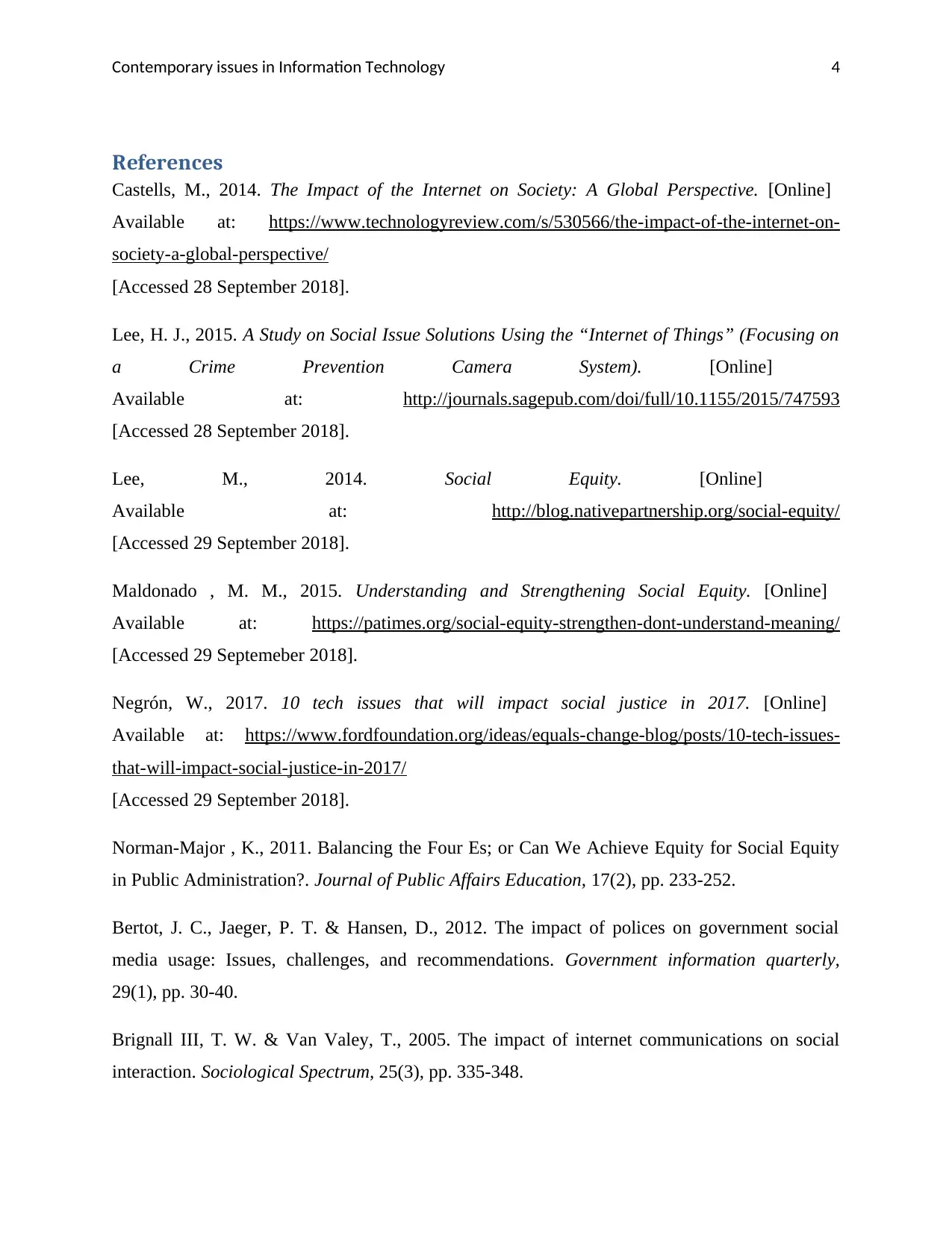
Contemporary issues in Information Technology 4
References
Castells, M., 2014. The Impact of the Internet on Society: A Global Perspective. [Online]
Available at: https://www.technologyreview.com/s/530566/the-impact-of-the-internet-on-
society-a-global-perspective/
[Accessed 28 September 2018].
Lee, H. J., 2015. A Study on Social Issue Solutions Using the “Internet of Things” (Focusing on
a Crime Prevention Camera System). [Online]
Available at: http://journals.sagepub.com/doi/full/10.1155/2015/747593
[Accessed 28 September 2018].
Lee, M., 2014. Social Equity. [Online]
Available at: http://blog.nativepartnership.org/social-equity/
[Accessed 29 September 2018].
Maldonado , M. M., 2015. Understanding and Strengthening Social Equity. [Online]
Available at: https://patimes.org/social-equity-strengthen-dont-understand-meaning/
[Accessed 29 Septemeber 2018].
Negrón, W., 2017. 10 tech issues that will impact social justice in 2017. [Online]
Available at: https://www.fordfoundation.org/ideas/equals-change-blog/posts/10-tech-issues-
that-will-impact-social-justice-in-2017/
[Accessed 29 September 2018].
Norman-Major , K., 2011. Balancing the Four Es; or Can We Achieve Equity for Social Equity
in Public Administration?. Journal of Public Affairs Education, 17(2), pp. 233-252.
Bertot, J. C., Jaeger, P. T. & Hansen, D., 2012. The impact of polices on government social
media usage: Issues, challenges, and recommendations. Government information quarterly,
29(1), pp. 30-40.
Brignall III, T. W. & Van Valey, T., 2005. The impact of internet communications on social
interaction. Sociological Spectrum, 25(3), pp. 335-348.
References
Castells, M., 2014. The Impact of the Internet on Society: A Global Perspective. [Online]
Available at: https://www.technologyreview.com/s/530566/the-impact-of-the-internet-on-
society-a-global-perspective/
[Accessed 28 September 2018].
Lee, H. J., 2015. A Study on Social Issue Solutions Using the “Internet of Things” (Focusing on
a Crime Prevention Camera System). [Online]
Available at: http://journals.sagepub.com/doi/full/10.1155/2015/747593
[Accessed 28 September 2018].
Lee, M., 2014. Social Equity. [Online]
Available at: http://blog.nativepartnership.org/social-equity/
[Accessed 29 September 2018].
Maldonado , M. M., 2015. Understanding and Strengthening Social Equity. [Online]
Available at: https://patimes.org/social-equity-strengthen-dont-understand-meaning/
[Accessed 29 Septemeber 2018].
Negrón, W., 2017. 10 tech issues that will impact social justice in 2017. [Online]
Available at: https://www.fordfoundation.org/ideas/equals-change-blog/posts/10-tech-issues-
that-will-impact-social-justice-in-2017/
[Accessed 29 September 2018].
Norman-Major , K., 2011. Balancing the Four Es; or Can We Achieve Equity for Social Equity
in Public Administration?. Journal of Public Affairs Education, 17(2), pp. 233-252.
Bertot, J. C., Jaeger, P. T. & Hansen, D., 2012. The impact of polices on government social
media usage: Issues, challenges, and recommendations. Government information quarterly,
29(1), pp. 30-40.
Brignall III, T. W. & Van Valey, T., 2005. The impact of internet communications on social
interaction. Sociological Spectrum, 25(3), pp. 335-348.
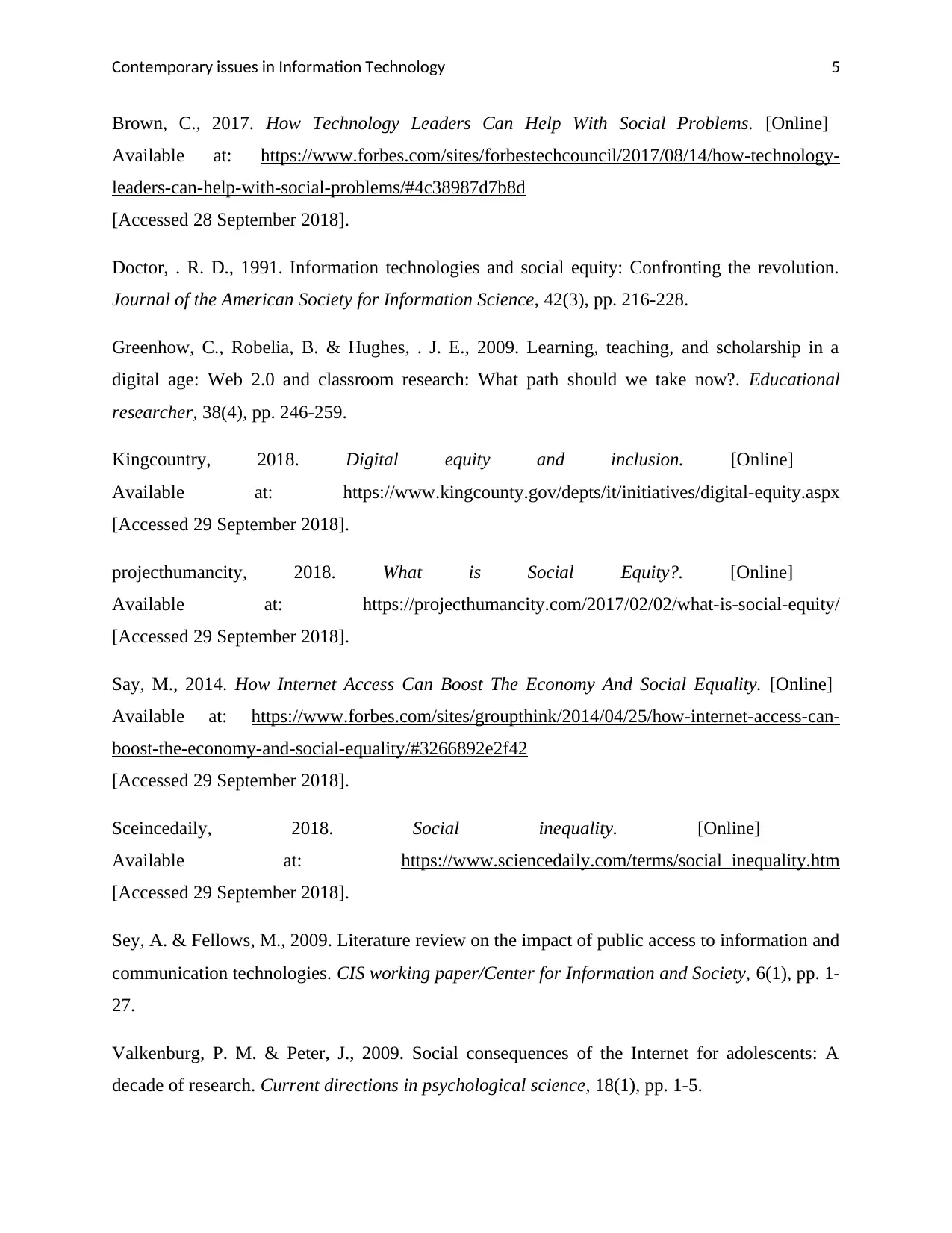
Contemporary issues in Information Technology 5
Brown, C., 2017. How Technology Leaders Can Help With Social Problems. [Online]
Available at: https://www.forbes.com/sites/forbestechcouncil/2017/08/14/how-technology-
leaders-can-help-with-social-problems/#4c38987d7b8d
[Accessed 28 September 2018].
Doctor, . R. D., 1991. Information technologies and social equity: Confronting the revolution.
Journal of the American Society for Information Science, 42(3), pp. 216-228.
Greenhow, C., Robelia, B. & Hughes, . J. E., 2009. Learning, teaching, and scholarship in a
digital age: Web 2.0 and classroom research: What path should we take now?. Educational
researcher, 38(4), pp. 246-259.
Kingcountry, 2018. Digital equity and inclusion. [Online]
Available at: https://www.kingcounty.gov/depts/it/initiatives/digital-equity.aspx
[Accessed 29 September 2018].
projecthumancity, 2018. What is Social Equity?. [Online]
Available at: https://projecthumancity.com/2017/02/02/what-is-social-equity/
[Accessed 29 September 2018].
Say, M., 2014. How Internet Access Can Boost The Economy And Social Equality. [Online]
Available at: https://www.forbes.com/sites/groupthink/2014/04/25/how-internet-access-can-
boost-the-economy-and-social-equality/#3266892e2f42
[Accessed 29 September 2018].
Sceincedaily, 2018. Social inequality. [Online]
Available at: https://www.sciencedaily.com/terms/social_inequality.htm
[Accessed 29 September 2018].
Sey, A. & Fellows, M., 2009. Literature review on the impact of public access to information and
communication technologies. CIS working paper/Center for Information and Society, 6(1), pp. 1-
27.
Valkenburg, P. M. & Peter, J., 2009. Social consequences of the Internet for adolescents: A
decade of research. Current directions in psychological science, 18(1), pp. 1-5.
Brown, C., 2017. How Technology Leaders Can Help With Social Problems. [Online]
Available at: https://www.forbes.com/sites/forbestechcouncil/2017/08/14/how-technology-
leaders-can-help-with-social-problems/#4c38987d7b8d
[Accessed 28 September 2018].
Doctor, . R. D., 1991. Information technologies and social equity: Confronting the revolution.
Journal of the American Society for Information Science, 42(3), pp. 216-228.
Greenhow, C., Robelia, B. & Hughes, . J. E., 2009. Learning, teaching, and scholarship in a
digital age: Web 2.0 and classroom research: What path should we take now?. Educational
researcher, 38(4), pp. 246-259.
Kingcountry, 2018. Digital equity and inclusion. [Online]
Available at: https://www.kingcounty.gov/depts/it/initiatives/digital-equity.aspx
[Accessed 29 September 2018].
projecthumancity, 2018. What is Social Equity?. [Online]
Available at: https://projecthumancity.com/2017/02/02/what-is-social-equity/
[Accessed 29 September 2018].
Say, M., 2014. How Internet Access Can Boost The Economy And Social Equality. [Online]
Available at: https://www.forbes.com/sites/groupthink/2014/04/25/how-internet-access-can-
boost-the-economy-and-social-equality/#3266892e2f42
[Accessed 29 September 2018].
Sceincedaily, 2018. Social inequality. [Online]
Available at: https://www.sciencedaily.com/terms/social_inequality.htm
[Accessed 29 September 2018].
Sey, A. & Fellows, M., 2009. Literature review on the impact of public access to information and
communication technologies. CIS working paper/Center for Information and Society, 6(1), pp. 1-
27.
Valkenburg, P. M. & Peter, J., 2009. Social consequences of the Internet for adolescents: A
decade of research. Current directions in psychological science, 18(1), pp. 1-5.
⊘ This is a preview!⊘
Do you want full access?
Subscribe today to unlock all pages.

Trusted by 1+ million students worldwide
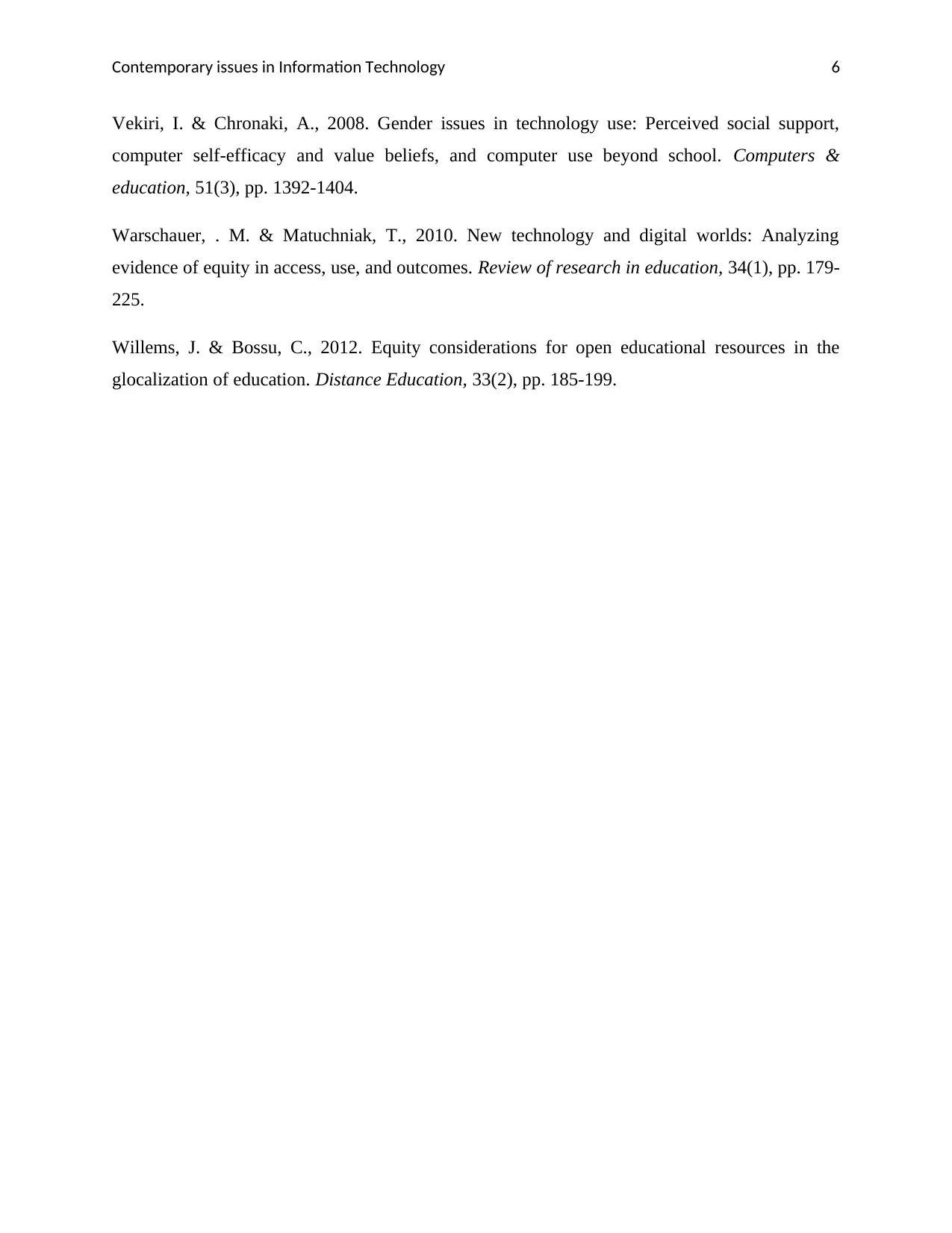
Contemporary issues in Information Technology 6
Vekiri, I. & Chronaki, A., 2008. Gender issues in technology use: Perceived social support,
computer self-efficacy and value beliefs, and computer use beyond school. Computers &
education, 51(3), pp. 1392-1404.
Warschauer, . M. & Matuchniak, T., 2010. New technology and digital worlds: Analyzing
evidence of equity in access, use, and outcomes. Review of research in education, 34(1), pp. 179-
225.
Willems, J. & Bossu, C., 2012. Equity considerations for open educational resources in the
glocalization of education. Distance Education, 33(2), pp. 185-199.
Vekiri, I. & Chronaki, A., 2008. Gender issues in technology use: Perceived social support,
computer self-efficacy and value beliefs, and computer use beyond school. Computers &
education, 51(3), pp. 1392-1404.
Warschauer, . M. & Matuchniak, T., 2010. New technology and digital worlds: Analyzing
evidence of equity in access, use, and outcomes. Review of research in education, 34(1), pp. 179-
225.
Willems, J. & Bossu, C., 2012. Equity considerations for open educational resources in the
glocalization of education. Distance Education, 33(2), pp. 185-199.
1 out of 7
Related Documents
Your All-in-One AI-Powered Toolkit for Academic Success.
+13062052269
info@desklib.com
Available 24*7 on WhatsApp / Email
![[object Object]](/_next/static/media/star-bottom.7253800d.svg)
Unlock your academic potential
Copyright © 2020–2026 A2Z Services. All Rights Reserved. Developed and managed by ZUCOL.





